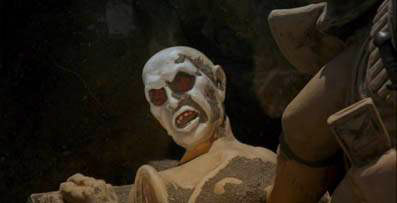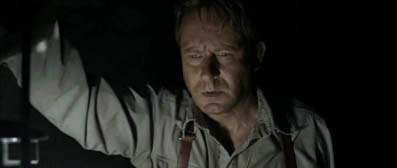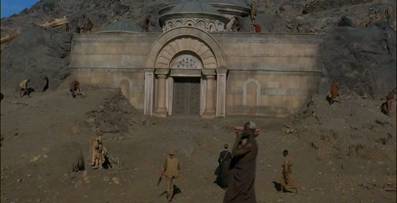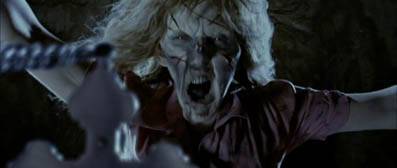|
Dictionary
definition of 'guilt': A feeling of having done wrong or failed in an obligation
We'll get to the guilt soon enough…
William
Friedkin went colossally over schedule and budget directing
the original movie of novelist William Peter Blatty's 70s
best seller The Exorcist. Already rightly
Oscared™ for The French Connection,
his ego at that time had not landed. The complaints from
the Warner Brothers' powers-that-were, were significant.
"You can see the wires!" was one of them (and
indeed if you look closely you actually can still see the
wires). But. A huge 'but'. When a film is made as meticulously
and as well as this one was, who cared? There was a slavish
attention to both character and plot, oh, so appreciated
in a 'horror' film and the special effects were ground-breaking
for the time. It didn't matter that a short sequence contained
a few shots, giveaways that it was 'only a movie'. You see, The Exorcist was never only a movie... The Exorcist was a rite of passage. The
Exorcist was an experience to get through to become a member
of the "I've seen The Exorcist" club. I saw. I
don't think I ever got through it though.

"What
an excellent day for an exorcism..." Still chilling
after over thirty years.
I
presume we're all familiar with the plot of the original?
Those that are, please move on down a hyphen and a full
stop – a young girl in Washington DC is inexplicably possessed
by a demon and battles with two priests in an exorcism to
save her life and conceivably her soul. It was one of the
most shocking films of the 70s, featuring scenes that would
fall foul of PC censorship today. You wouldn't even get
to write some of the more notorious scenes in script form.
Your word processor would report you to the FBI before you
could say 'cruelty to children'. I was going to say 'paedophilia'
but the only thing violating Reagan Teresa McNeil was a
crucifix. Jesus. There are six letters in each of her names
(666) and so what a shame her name was really Regan Teresa
MacNeil. Nowadays, after The Exorcist's
justifiable cinematic-canonisation by critic Mark Kermode,
the film suffers from its own reputation. It's been Ker-moded,
brought into the light, pored over and dissected –
even re-released re-cut to drum up more money. The next
generation, those raised to regard apathy as a fashion accessory,
will have none of it. Standing next to a few teenagers eyeing
the cover of the film, muttered dis-missives came, like
the infamous pea soup, thick and fast. "Seen it. It's
crap. It's not scary..." I cannot stress how close
I came to actively search for a time machine.
Well.
Let me take you back to the mid 70s, plonk you in a cavernous
cinema (you have got in under-age by the way (your platforms
are chafing) so that adds to the potential scare-factor)
and show you a film that scared the be-Jesus, the be-Buddha
and the be-Mohammed out of me. You have no pause button.
You have no volume control. You have no escape. Trust me,
Kermode is right. The Exorcist is without
question one of the best horror movies ever made. I've not
seen enough non-English language horror movies so 'one of
the' will have to suffice. So let's roll out John Boorman's
sequel. Oh, the power of Christ compels me not to (trust
me, it's beyond execrable; it is too execrable – and
beyond). What about the novelist's own stab (or rather decapitation)
at directing Exorcist sequels? Well, I
admired Exorcist III for all sorts of reasons
(chiefly Jason Miller's welcome reprise as Father Damien
Karras and the ever earnestly convincing George C. Scott)
but also for one moment of shock that made me jump higher
than Cheech and Chong. It's a moment I recently played to
a class full of fourteen year olds and they all jumped as
high as I did. If you see the second sequel, you'll know
exactly which part I mean. What was missing in both sequels
was something the original generated in spades, something
you took home with you, something that poisoned your imagination,
something that sat like a dark, malodorous stain in your
memory. What was it?
It
was dread; a great fear, a spectre at your shoulder that
told you that the irrational will kill you. Powerful stuff.

So
how about a dreadful 3rd sequel? Can you imagine being an
exec these days? "Hey, Batman went
back to the origin story…" "Superman is also back to his origin too." "Even an Indiana
Jones sequel went backwards…" So what
about Father Merrin's travails in Africa, briefly mentioned
in Friedkin's superb original? That throw-away line committed
Morgan Creek to invest in two prequels. Why two? The first
was offered to Paul Schrader. Schrader is a familiar cinephile/writer/director
to Outsider. He lost his job as a critic because he dared
to trounce Easy Rider. He wrote Taxi
Driver (Travis Bickle must be the patron saint
of American Outsider cinema). His love of firearms even
took right wing arms enthusiast and fellow writer/director
John Milius by surprise. He was an interesting choice given
the man's history (faith features heavily in Calvinist Schrader's
background as he was forbidden to watch movies as a child).
"We believed in a very real hell and very real evil.
My mother took my hand once and stabbed me with a needle.
She said, 'You know how that felt, when the needle hit your
thumb? Well, hell is like that ... all the time!'"
Way to go, Mom… You have to love religious faith,
no? Schrader's Exorcist IV (or Dominion)
was rejected by Morgan Creek. Apparently he did not make
a scary enough movie. Is it me or don't execs read the scripts
they employ people to make? Couldn't anyone tell if Dominion was going to be scary? Or is it really all in the direction
and never on the page? That's quite a loaded question.
So
they shelved it (they shelved it completely, no re-shoots,
no rescues, they chucked almost all of it away). Then in
an unusual move, even for Hollywood, they kept the same
actor to play the same leading role, the same actors in
the supporting roles with a few exceptions, ever-so-slightly
rewrote the script and hired Renny Harlin to make the second
one from exactly the same story. The mind boggles. This
is the first time I know of in Hollywood history that two
movies can be legitimately compared, both bastard twins
from the same warped womb.
And
they are both... No, won't spoil that surprise.
| common (consecrated) ground |
|
The
basic story on which both movies are based has some intriguing
elements. Father Lancaster Merrin (or Lankester, depending
on the source), von Sydow from the original, has had a really
bad experience with the Nazis in Holland. Think Sophie's
Choice times ten. He loses his faith, as you do,
and is plunged into a black hole of guilt. This, of course,
means he transforms into Indiana Jones and moves out to
Africa to fetch an unnamed item from a buried church. The
locals believe the church houses an evil spirit (my god,
the locals, at last, are right!) and do not want the white
clergy digging it up supported by the British Army. High
jinks ensue – bloody deaths in both movies –
and Merrin is forced to admit, "OK, there really is
a God and I'd better believe it before I become Demon paté…"
The power of Christ compels him.

Schrader's Dominion is the more sedate affair attempting
to bring out a sort of metaphysical discomfort for the hero
(guilt in Merrin's case under Schrader is Stellen Skarsgård
looking miserable a lot). Permit me a s(n)ide note regarding
guilt. I've always thought that if the feeling of having
done wrong was a prison sentence, guilt was the time you
chastised yourself for. In effect, guilt absolved you of
your wrong-doing. Guilt is preparing the permission to do
the bad thing again. It's a slate cleaner. I would probably
be more appreciative of Schrader's take on Merrin if I afforded
guilt the profound depths of sorrow and existential anguish
as Schrader clearly does. The Nazi event is shown front
and centre so the audience is absolutely certain why Merrin
is like he is.
Harlin
went for the slow burn and leaked out details of the incident
over the running time (a better option for my money as there
was a sort of tickle of suspense, that is you kept asking
yourself "What did happen to Merrin in Holland?").
Harlin's Beginning is the bells and whistles
prequel. It's not certain if he ever saw Schrader's cut
but there are so many direct similarities, I often wondered
if both men used the same storyboard artist. In terms of
the profundity of guilt in Harlin's Merrin, let's just say
Harlin doesn't strike me as the profound type. No, Merrin
is a miserable Indiana Jones. Harlin goes straight for the
CG set piece with an intriguing opening featuring an ancient
war. The only link to anything in the Exorcist universe is that literally damned Pazuzu head. So it's pretty
meaningless in the sense of both pretty (a lengthy CG pull
back over thousands of crucified bodies, quite a 'Wow!'
shot) and utterly meaningless. Harlin quotes Friedkin a
lot except for the dread of course. Neither of the film-makers
get the dread right (or at all) but I suspect that's a fifty-fifty
responsibility split between them and the twenty first century
Hollywood machine.
You know those moments in movies, the bucket of water in
the face of the audience? The 'we didn't have enough money
to get this right' moment. Let's call it the Scorpion King
débacle (see The Mummy sequel and
tell me ILM were at the top of their game). The African
boy soon to be possessed is shunned by his tribespeople.
Merrin wants to offer him water (not in the face). A lovely
hyena growl makes you jump from the left speaker and out
pop three or four examples of cheap CG animals which take
you out of the movie as sure as an attack of diarrhoea.
Schrader does not comment on these beasts. I laughed. One
should not be able to laugh in an Exorcist movie. There's also a cheap, crappy snake effect that brought
to mind the earliest CG. I can only assume money was tighter
than tight. By contrast Harlin's CG hyenas are almost as
woeful but shot in shadow and therefore just about acceptable.
The fact they are graphically tearing a young boy limb from
limb kind of detracts you from being too critical. Schrader's
cows eating hyenas (I suspect a mix of CG and animatronic)
is just as risible. The believability of any effect in a
horror movie is absolutely critical. There were two many
effects shots in both efforts to pull you out of the movie
and into "that's so phoney..." territory.
Schrader
inserts an inept dream sequence. Coming after Karras' in
the original, it succeeds only in being underdeveloped,
needlessly confusing and he even admits in the commentary
that because it was a dream, the significance of the woman's
identity was not important. Every shot in a move has got
to be important and thought out otherwise why am I watching
it? Read Kermode's excellent BFI Classic volume on The
Exorcist and specifically his analysis of Karras'
dream and you can well understand why I'm singling Merrin's
dream out. It is unfocussed and plain, vague even. Friedkin's
is masterfully oblique and packed so full of meaning, it
almost pushes you out of your seat. Harlin doesn't indulge
himself in this area. He just gets on with the demon schtick.

One
last thing, an irony if you will. The line in The
Exorcist speaks of Merrin's exorcism in Africa...
of Merrin having had experience; "Ten, twelve years
ago, I think, in Africa. The exorcism supposedly lasted
months. I heard it damn near killed him." Do we assume
Merrin lied, sexed up his report? Has Harlin put his need
(or presumption of his audience's need) ahead of his reverence
for the original? He's so careful to adore Friedkin's masterpiece
with visual quotes but in the end he has to please the audience
(who presumably would balk at a two month running time)
and blithely take about ten minutes to oust the demon. Well,
at least this is where Schrader concurs with a similar timescale
to do what's needed. That Merrin, what a fibber.
As a final stab in the dark as to why The Exorcist just does not work in African sunlight regardless of the
director... The original film's dread, its icy foreboding
was mired in the ordinary, set firm in suburbia where demonic
possession only occurs after too many Ferrero Rochers. The
scariest sight was the repeated shot of a bedroom door.
You open up a diseased space and it's effect is diluted.
In that bedroom there was real terror. Shot in the vistas
of Africa are two gorgeous looking films with not one single
whit of dread. A devil of a shame.
| sound and vision (Dominion) |
|
Well,
here we move up a notch. Presented in 2.40:1 anamorphic
(honest guv, that's what it says but it measures up as 2:1),
Mid budget-plus Hollywood movies always are turned out very
nicely. Vittoro Storraro's cinematography makes you feel
like batting away mosquitoes and the "Boo!" sound
effects and especially the demon voice effects are beautifully
presented with minimal but very effective use of the Dolby
Digital 5.1 soundtrack. Surround sound use is nicely atmospheric
and effect spare but jarring when it needs to be.
| extra features (Dominion) |
|
Stills
Deleted Scenes
Commentary by director Paul Schrader
Stills,
OK. Not many, nothing special. The six deleted
scenes have no director commentary option
on them. This renders them interesting curios, out of any
context, nothing more (and one of them is almost a shot
for shot version of a scene in Harlin's Beginning).
Schrader's commentary is… uh. This
man is an Outsider hero so I'm hesitating. He sounds almost
bitter, tired and like he was reluctantly dragged into the
studio to do the commentary. There are huge breaks when
he obviously felt he had nothing to say (over certain scenes
can you blame him? He was very quiet over the CG stuff,
the silence of excruciating embarrassment perhaps). He was
at his more interesting commenting on how movies have changed,
how rules are now non-existent (nice to see he still takes
care over things like the 'line' of sight in movie making).
His admiration (like Harlin's) for Storraro was significant,
often meandering off into many a Vittoria lighting story.
His support for his leading lady, Clara Bellar, is refreshing
given that Harlin chose to replace her wanting someone more
Hollywood-glamour. All in all, a curious addition to the
commentary genre.
| sound and vision (The Beginning) |
|
Presented
2.35:1 anamorphic, The Beginning boasts
sumptuous visuals. Much like it's evil twin (hey, they are
both evil twins, now there's a twist) the Storraro photography
is superb and features light you can almost taste. Harlin's
movie does enjoy quite a few CG moments but they generally
serve the story and he's smart enough to keep the CG in
the shadows so his hyenas at least nod towards realism.
Like Dominion, the 5.1 Surround sound is
excellent and the only reason for any real shocks. "Boo!"
Dread? There is no dread.
| extra features (The Beginning) |
|
Theatrical
Trailer
Behind The Scenes featurette
Commentary by director Rene Harlin

Hilarious!
The trailer is footage from Schrader's
movie! How I laughed. The Behind The Scenes
featurette is funny too because everyone is
reading the script – "How great it is to be working
on this movie" but no one is that good an actor. Even
Harlin (whose respect for the original is at least intact)
comes across as a man trying so hard to be hyper-enthusiastic
and falling hard at the first fence. Add to this his Finnish
Arnie-like monotone and the featurette starts to work against
the film itself.
The commentary track sounds like
Harlin had read all the reviews. There is a resigned apologetic
tone to some remarks that is almost quite touching. It's
like he tried, he really did but to get to the original's
level of horror, you have to have the afore mentioned time
machine. His commentary is instructive with few gaps and
he harks back to the original many times. Keen fans of The
Exorcist don't need reminding when Harlin had visually
quoted Friedkin. Given this, it was still fun to listen
to, unlike the teeth pulling going on in Dominion's
Special Features.
Two Exorcist prequels, two very different directors.
Both totally up Morgan Creek without a cassock. Both pretty
damn poor with excellent sound and vision. Schrader's is
a meandering, faux-profound treatise on faith and Harlin's
is a wanton bloodbath of unutterable mediocrity. Shockingly,
both are as frightening as a mug of Horlicks on crochet
night. If you tamper with the greats, you give yourself
ample opportunities to be compared to greatness and both
Schrader's and Harlin's movies are found woefully wanting;
wanting a decent script, a decent number of scares, a small
number of effects that do not produce howls of derision
and a modicum of common sense so the audience doesn't reach
into its own logic board and say "Hang on, if this
demon chappie can kill with a stare, levitate, and has superhuman
strength, why doesn't it just slam Merrin into a wall at
high speed and have done with him?" A shame but there
it is.
Oooh!
They've re-made The Omen. I cannot wait.
...long
enough.
|